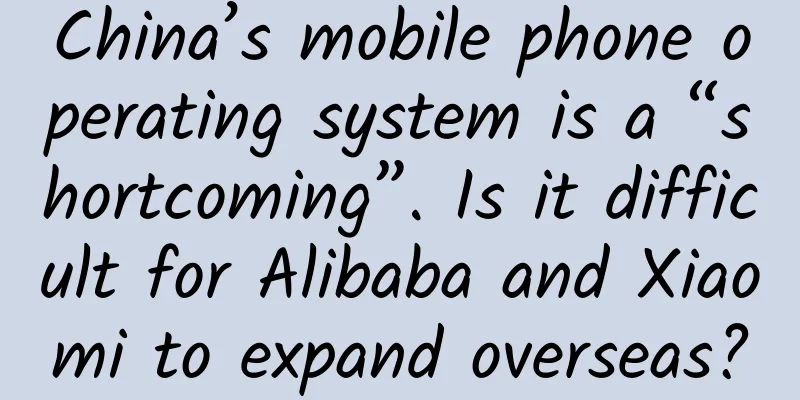China’s mobile phone operating system is a “shortcoming”. Is it difficult for Alibaba and Xiaomi to expand overseas?

|
In the early morning of November 2, during the "2015 China Mobile Innovation Week and China Mobile Design and Maker Innovation Competition", Ni Guangnan, an academician of the Chinese Academy of Engineering, said in an interview with Sohu Technology that compared with Apple and Google, the current shortcoming of Chinese mobile phones lies in the operating system. In addition to the hidden dangers in information security, the intellectual property risks of relying on the Android system developed by Google will also make it difficult for them to go abroad. Is it difficult to go abroad based on the Android system? "From the current perspective, the weakest link in China's mobile phone production is the mobile phone operating system," said Ni Guangnan. The operating system leads an ecosystem. In terms of core technology, the CPU operating system is more important. No matter how it develops, its current status has not changed. The chip system is formed by the operating system and CPU. China should have its own operating system and independent CPU to build an ecosystem. In the past few years, the Chinese government and enterprises have also made efforts in independent operating systems. For example, Alibaba YunOS, Xiaomi MIUI, Huawei Kirin OS and other mobile phone operating systems are all called "independent innovation" mobile phone operating systems. What is the actual situation? Ni Guangnan analyzed that there are barriers to large-scale commercial use of operating systems such as Alibaba and Xiaomi in China. For example, it is difficult for Alibaba YunOS and Huawei to "join forces" (Note: Huawei launches new mobile phones based on Kirin OS). In addition, they are all modified through the Android system, so they may encounter intellectual property issues when going abroad. However, Alibaba Group Deputy CTO Jiang Peng said in an exclusive interview with Sohu Technology in Shanghai: From the perspective of technological development trends, today's OS is outdated and destined to be eliminated. Currently, Alibaba YunOS, Android, and Windows are all developing the next generation of operating systems. Alibaba YunOS will try to help Chinese mobile phone companies accelerate their overseas expansion this year, and the "YunOS Navigation Edition" launched at MWC Shanghai is also the first global version. Jiang Peng also said that operating YunOS in the early years was like "playing with a nine-section whip." Alibaba has accumulated a lot of experience in how to cooperate with chip and terminal manufacturers, and occasionally hurts itself, but after being hurt, it will not make the same mistake again. Ni Guangnan also pointed out that Alibaba Cloud, Xiaomi, Huawei and others have done a good job. However, there are about 10 such operating systems in China, which is too many. Basically, they cannot be said to be independent. They are mainly customized or localized based on Android. Some people say that this is "borrowing", but no matter what, they are all based on the Android operating system, and may involve intellectual property issues. No "internal fighting", national top-level design In Ni Guangnan's view, there are three reasons why China does not have its own smart terminal operating system: First, Chinese companies are not big enough, with a total market value of only about one-third of that of the United States. In the global corporate rankings, Apple, Android, and Microsoft are at the top, while China Mobile, Alibaba, and Tencent seem to be a little behind. The technological innovation capabilities of Chinese companies are not strong enough; second, the technological innovation capabilities of Chinese companies are not strong enough, and companies like Huawei with more than 70,000 R&D personnel are rare in China; third, China has not formed a national will and lacks top-level design. In terms of mobile operating systems, the national science and technology plan did not fully evaluate the risks of intellectual property rights, and supported many companies to make customized versions on Android, which is both low-level duplication and unable to achieve independent control. There is a problem of "players and referees" in the allocation of national plan funds, and the funds cannot be used fairly, justly, reasonably and effectively. There is a lack of understanding of open source software, and scientific and technological funds cannot support the open source community. They can only adopt a take-it-or-leave-it approach, which not only poses intellectual property risks, but also cannot form their own community support and lacks sustainable development capabilities. "Our innovation is not only about technological innovation (product innovation, brand innovation, business model innovation, etc.), but also about industrial organization innovation. We want to form an operating system alliance through industrial alliances. Although it is not very complete now, it is also a way to better gather innovative forces, integrate resources, and avoid internal strife." Ni Guangnan analyzed that if China wants to make a breakthrough in operating systems, it still depends on the market, and the government can only provide policy support. Tencent, Alibaba, Baidu, etc. are all major players in the development and market competition. If you want to make application software APP, you can make thousands of them based on Android. However, making mobile smart terminals is different. There is a monopoly. The world has formed a monopoly situation of Apple, Google and Microsoft. Therefore, it is not easy to succeed. Therefore, if a smart terminal operating system can be made, this company may also become the leader in this industry. So if China wants to do this, it is no longer a technical issue. It will take 2-3 years to build the "world's fourth largest operating system" Ni Guangnan believes that in the mobile field, Android, Apple, and Microsoft are currently the main players, and he hopes that China can have its own operating system and become "the fourth smart terminal operating system in the world." In other words, if someone in China uses it, this operating system will become the fourth in the world. So, how to make the fourth operating system? Ni Guangnan said that we should carry forward the spirit of "two bombs, one satellite and manned space flight", give full play to my country's advantage of concentrating its efforts on major tasks, and make a breakthrough in the independent operating system of smart terminals from scratch. Ni Guangnan gave an example, saying that China's Beidou GPS system is very successful. The investment in mobile phone operating systems is much smaller than Beidou. Information plus aerospace, the operating system only needs human investment. "Domestic smart terminal operating systems must adopt advanced business models." Ni Guangnan said that the Android and Apple systems have an advantage in the mobile market, not because their technology is much stronger than Microsoft's, but because the "app store" model they adopt is better than Microsoft's traditional business model of selling software licenses and bundling sales. At present, Beijing Yuanxin Technology Co., Ltd. has entered the media's attention. Zhao Chunlei, general manager of Yuanxin Technology R&D Center, previously said: Yuanxin operating system is based on digesting and absorbing mature foreign technologies, mastering all the source code and technical evolution direction of the system, and making a lot of technical changes to the system framework, security services and graphics system. In other words, "Yuanxin" fundamentally masters the "DNA" of its own system. Ni Guangnan revealed to Sohu Technology that compared with the independent operating systems of China Unicom's WoPhone and China Mobile's OPhone platforms that have been "lost" for many years, Yuanxin Technology has invested huge amounts of money this time and is going all out, but whether it will be successful still depends on marketization. Previously, Sun Zhenge, vice president of ZTE, said in an interview that mobile phones based on ZTE's independent mobile operating system (based on Linux) and Xunlong chips will soon be on the market. China's own mobile phone operating systems continue to emerge, and it is worth looking forward to which one will become the fourth largest operating system. Ni Guangnan told Sohu Technology, "The Android system was not perfect at the beginning, and it has undergone many upgrades. China's own mobile phone operating system will be realized in at least 2-3 years." As a winner of Toutiao's Qingyun Plan and Baijiahao's Bai+ Plan, the 2019 Baidu Digital Author of the Year, the Baijiahao's Most Popular Author in the Technology Field, the 2019 Sogou Technology and Culture Author, and the 2021 Baijiahao Quarterly Influential Creator, he has won many awards, including the 2013 Sohu Best Industry Media Person, the 2015 China New Media Entrepreneurship Competition Beijing Third Place, the 2015 Guangmang Experience Award, the 2015 China New Media Entrepreneurship Competition Finals Third Place, and the 2018 Baidu Dynamic Annual Powerful Celebrity. |
>>: Accenture: Technology Vision Report 2022
Recommend
3 tips for information flow optimization + 8 cases, if you don’t believe me, you can’t do it well!
With the arrival of winter vacation, many busines...
Talk about 5 distribution mechanisms of video content
What position does content distribution occupy in...
A brief discussion on the "high refresh rate" of mobile phone screens
Perhaps the most popular term in smartphones sinc...
Why is it a false proposition that “everyone broadcasts live and everyone watches”
Live streaming is very popular, especially in Aug...
Dingxiang Mama's "Breastfeeding Guide"
Dingxiang Mama's "Breastfeeding Guide&qu...
When the campus environment and job-seeking environment are changing, how can operators continue to grow?
It is not an exaggeration to say that good operat...
Zhijiang SEO Training: How to quickly get your domain name included?
As an SEO optimizer, you may have encountered the...
The three major operators are pushing gigabit broadband, so when can we use it?
As the implementation of the "speed increase...
There are many forms of online shopping fraud. Please forward this prevention guide to the "Loving Family" group!
In recent years, with the popularization of the I...
Analysis of DianTao VS Douyin e-commerce live streaming competition
As the cost of acquiring customers on major e-com...
Chengdu Tea Tasting 2022 Best Tea Drinking Place Selection Studio Ayang Recommends
The recommended tea tasting place in Chengdu is o...
Marketing hot spots calendar for January 2022!
We have prepared a marketing hotspot calendar for...
Foreign media evaluates the current status of China's e-commerce logistics: profound changes are about to hit
Foreign media reported that according to statisti...
Tourist's hair suddenly stood up, netizens reminded: Get out of here! Experts said: Don't run around!
Recently, in Turpan, Xinjiang Tourists' hair ...
Thai fragrant rice = local rice + essence? How to choose the real "fragrant rice"?
Last night's 3.15 Party featured a number of ...









